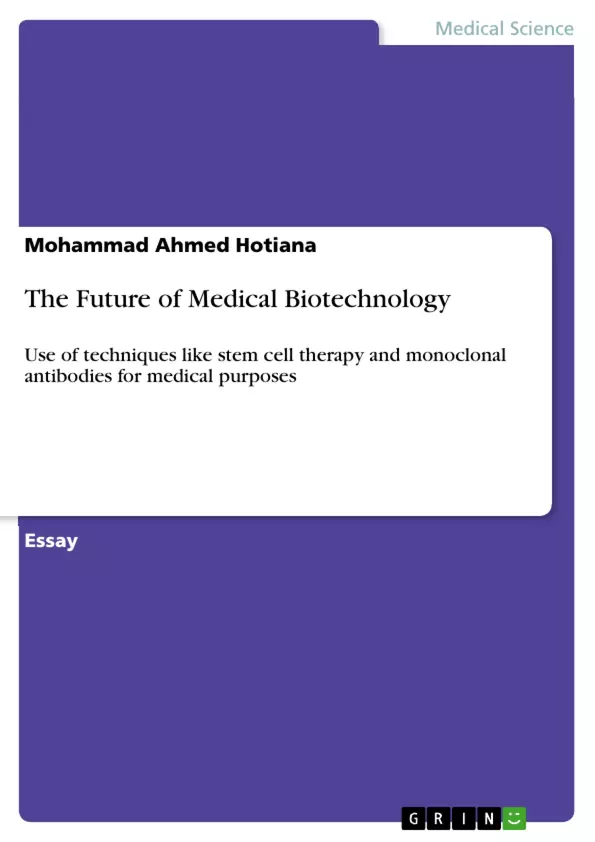This paper exclusively deals with medical biotechnology, which is the fusion of genetics, molecular biology and a number of other disciplines in biology to bring about advancements in medicine and health-science. There have been great advancements in the field of medical biotechnology due to the inculcation of new technique and practices such as PCR, cell cultures, recombinant DNA technology .etc. As the world is looking up to medical biotechnology to improve the lives and health of individuals in the coming years, we embark on a journey to explore some of the upcoming medical advancements offered by medical biotechnology.
Some advancements being brought about in medical biotechnology have the ability to revolutionaries health-science in a manner we could have never imagined. Two such advancements in medical biotechnology that we will be exploring in this text include; the use of stem cells for regenerative medicine and the use of monoclonal anti-bodies for specific antibody-antigen response.
Inhaltsverzeichnis (Table of Contents)
- Stem cell therapy
- The principle of stem cell therapy
- Stem cell therapy has exhibited promising results
- To produce stem cells researches around the world are exploring
- Monoclonal antibodies
- Antibodies are proteins produced by the immune system
- There are four types of monoclonal antibodies, namely
Zielsetzung und Themenschwerpunkte (Objectives and Key Themes)
This paper explores the future of medical biotechnology, focusing on two significant advancements: stem cell therapy and monoclonal antibodies. The paper aims to showcase how these advancements are revolutionizing health science and offer insights into their potential to improve human health and longevity.
- The potential of stem cell therapy for regenerative medicine
- The use of monoclonal antibodies for targeted antibody-antigen responses
- The development of new techniques for producing artificial stem cells
- The ethical considerations surrounding stem cell research
- The role of biotechnology in tackling global health challenges
Zusammenfassung der Kapitel (Chapter Summaries)
The text begins by introducing the field of medical biotechnology and highlighting its importance in advancing medicine and health science. It then delves into the use of stem cells in regenerative medicine, exploring the different types of stem cells, the principles of stem cell therapy, and its potential applications in treating various diseases and conditions. The text also discusses ongoing research in stem cell therapy, including the development of new techniques to produce artificial stem cells.
The text then examines the use of monoclonal antibodies, explaining their specific targeting capabilities and highlighting their importance in the immune system. It explores the different types of monoclonal antibodies and their applications in various therapeutic strategies. The text concludes by emphasizing the transformative potential of these advancements in medical biotechnology and their role in shaping the future of healthcare.
Schlüsselwörter (Keywords)
The main keywords and focus topics of the text include medical biotechnology, stem cell therapy, regenerative medicine, monoclonal antibodies, antibody-antigen response, artificial stem cells, somatic cells, and ethical considerations. These terms encapsulate the primary concepts and research areas discussed in the paper.
Frequently Asked Questions
What is medical biotechnology?
It is the fusion of genetics, molecular biology, and other biological disciplines to advance medicine and health sciences.
What is the potential of stem cell therapy?
Stem cell therapy is key to regenerative medicine, offering promising results for treating various diseases by replacing damaged cells.
How do monoclonal antibodies work?
They are proteins that provide a specific antibody-antigen response, allowing for targeted treatment of specific conditions.
What are the four types of monoclonal antibodies?
The text mentions that there are four distinct types, though specific names depend on the source (typically murine, chimeric, humanized, and fully human).
Are there ethical concerns in this field?
Yes, the paper highlights ethical considerations, particularly surrounding stem cell research and the development of new biotechnologies.
- Citation du texte
- Mohammad Ahmed Hotiana (Auteur), 2018, The Future of Medical Biotechnology, Munich, GRIN Verlag, https://www.grin.com/document/425811



